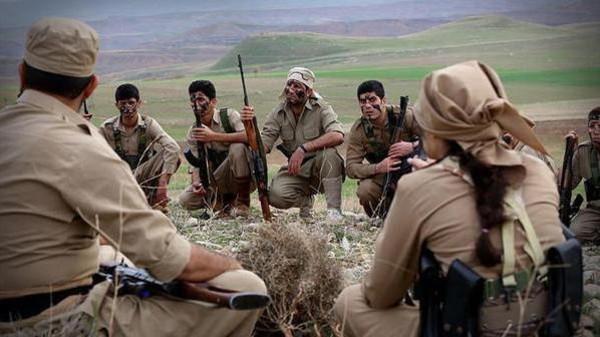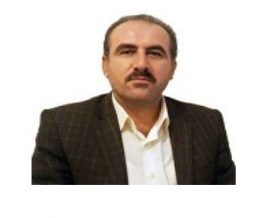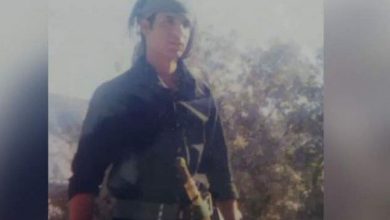Aria Moradi, a 17-year-old boy from Marivan, was lured into the armed group KOMALA through deceptive promises on the social media platform Telegram. Thanks to the relentless efforts of his family, however, he was able to escape this dark path. Aria’s story reflects a bitter reality in Kurdistan society that has ensnared hundreds of families.
In recent years, the armed group KOMALA, which positions itself as a defender of the rights of the Kurdish people, has been repeatedly criticized for recruiting and exploiting teenagers in its propaganda, training, and even military activities.
While the group’s official statements speak of freedom and democracy, in practice, it preys on the psychological, financial, and emotional vulnerabilities of teenagers to separate them from their families and confine them within its closed, militarized environment.
According to fieldwork data collected by Iranian Kurdistan Human Rights Watch, numerous cases of recruitment or attempted recruitment of minors by various factions of KOMALA and other paramilitary groups have been reported over the years. Most of these teenagers were initially contacted through social media platforms like Telegram, Instagram, or WhatsApp by individuals posing as “friends, fellow ideologues, or political activists,” who were, in fact, recruiters.
The following interview with Aria Moradi is a clear example of this dangerous tactic.
Interview with Aria Moradi, Former Member of the Armed Group KOMALA
Could you please introduce yourself and explain how you first came into contact with the armed group KOMALA?
My name is Aria Moradi. I was born on December 20, 2007, in Marivan. I currently live in Sarvabad and was staying in a student dormitory. I was a 12th-grade science student, and most of my time was dedicated to studying for the national university entrance exam. A few months ago, through a Telegram channel called “Shawayl Kermanshah,” I met a person who introduced himself as “Sirwan.” Initially, he pretended he was just looking for friendship and conversation, but he gradually started talking about the KOMALA group and the “bright future” of its members. That’s where the process of deceiving me began.
What factors specifically led you to decide to join the group?
To be honest, it was mostly due to youthful naiveté and excitement. Sirwan’s words completely swept me into a fantasy; he spoke of money, facilities, homes, and cars. He even mentioned “meeting beautiful girls” as part of the life in the group. At the time, I genuinely didn’t know what was hidden behind these promises. He spoke as if KOMALA was a modern, free organization and that its members lived in complete comfort. These promises, and perhaps my own inexperience, caused me to leave the dorm without considering the consequences and travel toward the border with another group member named “Keyvan.”
When you arrived at the KOMALA base, what was the reality like? Did it match the promises you had been given?
No, nothing was like their promises. The moment I arrived, I realized everything had been a lie. It was a closed environment, full of restrictions and distrust. There was no sign of money, comfort, or freedom. Most of the young people there were tired and hopeless. We slept in cold rooms at night and did various tasks during the day, none of which were appropriate for my age and ability. I quickly realized they had just exploited my emotions and simplicity.
How did you feel during the time you were with the group?
I felt fear and regret, right from the first few days. I thought I might find a way to return, but I was scared. The group’s atmosphere was heavily controlled; even speaking with other new members required permission. I was 17, separated from my family for the first time. Every night, I told myself I wished I had never been fooled by those messages.
How were you able to leave the group and return to the country?
Fortunately, my family acted quickly once they realized I was missing. They traced my whereabouts through acquaintances and various institutions. After about three weeks, thanks to my family’s persistence and mediation, I was able to get out of there and return to Iran. If I had stayed a few more days, I might not have gotten this chance.
Now that you’re back, how do you look back on that period?
That short time was the bitterest experience of my life. Even though it lasted less than a month, I realized that no group that starts with lies and deception can have a righteous goal. Today, I’ve returned to school, and I want to build my future through my own education and effort, not with the empty promises of others.
If you have a message for teenagers your age, what would it be?
I urge everyone to be careful on social media. The people hiding behind those messages don’t want to help you; they are only looking to deceive and exploit young people. I made a mistake, but I was lucky to come back alive. Nothing is worth sacrificing your family, your studies, and your future for the false words of a terrorist group.
Aria Moradi’s story once again illustrates that child soldiery today does not necessarily begin on the battlefield; it starts on a mobile phone screen. Social networks and messaging apps have become effective tools for armed groups to deceive teenagers in an informal and seemingly friendly space. Emotional promises, money, or even imaginary freedoms are used as tools for the mental control of the victim.
According to legal reviews, such behavior falls clearly within the scope of Article 38 of the UN Convention on the Rights of the Child, constituting the exploitation of children in armed conflict. This places groups like KOMALA, PDKI, PAK, and PJAK among the serious violators of human rights.
Aria Moradi’s ordeal is a warning—a warning for families, schools, and cultural institutions. While Kurdish armed groups operate on the territory of the Iraqi Kurdistan Region, there is no effective mechanism by the Regional Government to monitor the activities of these groups, and this legal vacuum perpetuates the violation of Iranian minors’ rights.
Iranian Kurdistan Human Rights Watch, while expressing gratitude for the cooperation of the Moradi family, once again calls on international bodies including UNICEF, the United Nations (UN), and the Kurdistan Region’s Human Rights Commission to:
- Conduct an independent investigation into the recruitment of Iranian teenagers by the KOMALA group.
- Hold the Kurdistan Regional Government accountable for the activities of these groups.
- Implement awareness programs in schools in Iranian border regions to prevent the deception of minors.
Aria Moradi has returned to school today, but his voice is a reminder of the hundreds of other teenagers who may still be trapped by warm Telegram lies in the cold mountains of the Kurdistan






